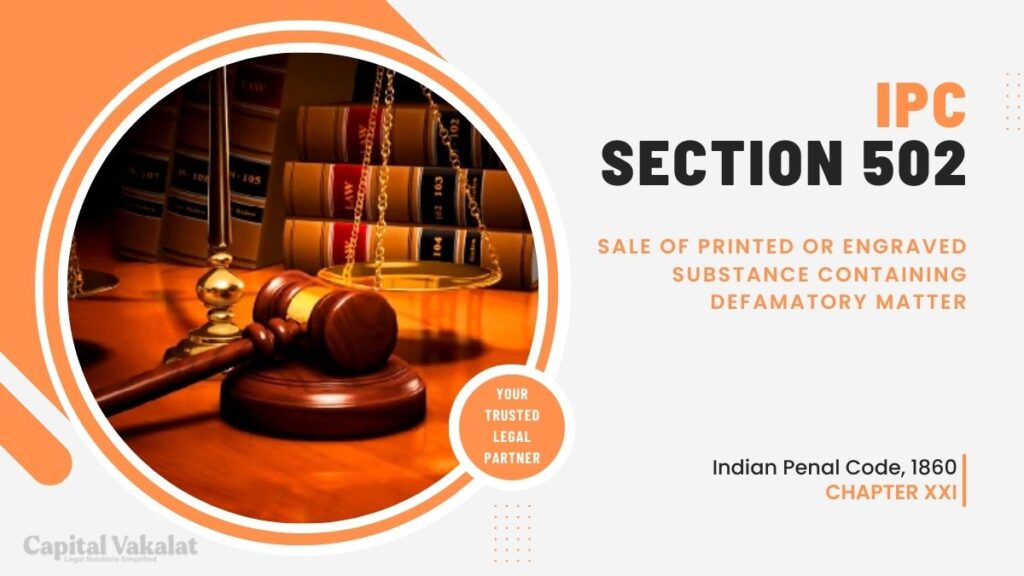In the dynamic landscape of legal frameworks, Section 502 of the Indian Penal Code (IPC) stands as a safeguard against the sale of printed or engraved substances containing defamatory matter.

This article delves into the intricacies of Section 502 IPC, exploring its historical context, legal implications, challenges in enforcement, and the evolving role of technology.
Understanding Section 502 IPC
Section 502 IPC specifically addresses the act of selling or offering for sale any printed or engraved substance containing defamatory matter. To comprehend its significance, it’s crucial to unravel the provisions and legal repercussions associated with this section. Violators may face penalties, including fines and imprisonment, highlighting the gravity of the offense.
Defamation in Print: A Legal Perspective
Defamation in print carries its own set of legal considerations. The article examines the nuanced definition of defamation in the context of printed or engraved materials, shedding light on the key elements that constitute defamatory matter. This section aims to provide clarity on what falls within the purview of Section 502 IPC.
Historical Precedents and Landmark Cases
A journey through historical precedents and landmark cases reveals the evolution of legal interpretations related to Section 502 IPC. By analyzing past judgments, readers gain insight into how the judiciary has shaped the application of this section over time. The impact of these cases on current legal perspectives is explored, emphasizing the evolving nature of defamation laws.
Challenges in Enforcing Section 502 IPC
Enforcing Section 502 IPC presents a myriad of challenges. From monitoring the sale of defamatory materials to addressing loopholes in the legal framework, this section scrutinizes the difficulties authorities encounter in effectively curbing the circulation of such content. Identifying these challenges is crucial for proposing pragmatic solutions.
The Role of Technology in Defamation Cases
As technology advances, so do the challenges in enforcing defamation laws. The article explores how digital platforms and social media complicate the task of regulating printed or engraved defamatory content. Examining the intersection of technology and legal frameworks sheds light on the need for adaptive strategies.
Impact on Freedom of Expression
Balancing the need to curb defamation with the right to freedom of expression is a delicate task. This section navigates the fine line between preserving free speech and preventing defamation. Real-world cases are dissected to understand instances where artistic expression clashes with defamation laws, sparking debates about the limits of creativity.
International Perspectives on Defamation Laws
A comparative analysis of defamation laws across different countries provides a global perspective. By examining international approaches to regulating printed or engraved defamatory content, readers gain insights into diverse legal frameworks. Lessons learned from other jurisdictions can inform improvements in India’s defamation laws.
Public Awareness and Education
Effective enforcement of Section 502 IPC requires public awareness and education. The article underscores the importance of educating the public about defamation laws, advocating for responsible expression. Initiatives to raise awareness and promote a culture of responsible communication are explored to address the root causes of defamatory content.
Conclusion
In conclusion, Section 502 IPC plays a pivotal role in regulating the sale of printed or engraved substances containing defamatory matter. This article has navigated through its provisions, historical context, legal implications, challenges, and the evolving landscape shaped by technology. Striking a balance between freedom of expression and preventing defamation remains a continuous challenge, requiring collaborative efforts from legal authorities and the public.
Frequently Asked Questions
How can the public contribute to the enforcement of Section 502 IPC?
Public awareness is crucial. By understanding defamation laws, individuals can refrain from creating or promoting defamatory content. Reporting instances of violation also aids law enforcement.
What role does technology play in the challenges associated with enforcing Section 502 IPC?
Technology amplifies the reach and speed of information dissemination, making it challenging to monitor and control defamatory content. Adapting legal frameworks to the digital age is essential.
Are there any recent amendments or proposed changes to Section 502 IPC?
As of the last update, there were no recent amendments to Section 502 IPC. However, it’s advisable to stay informed about any legislative changes.
How can individuals seek recourse if they become victims of defamation covered by Section 502 IPC?
Victims can file complaints with law enforcement agencies, initiating legal proceedings against those responsible for the sale of defamatory materials. Consulting legal experts is recommended for personalized advice.